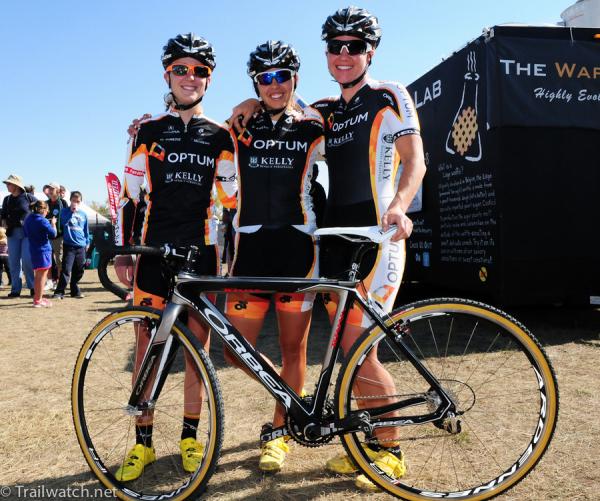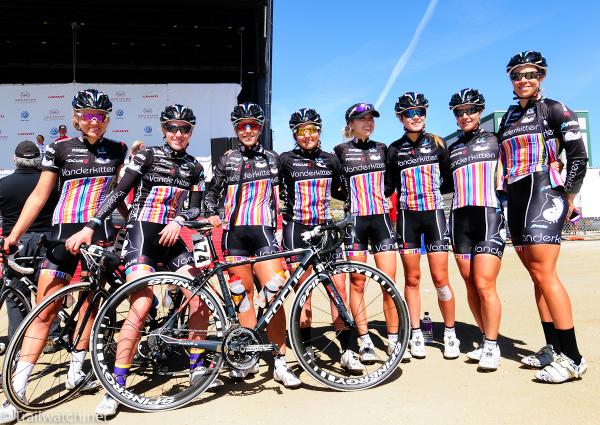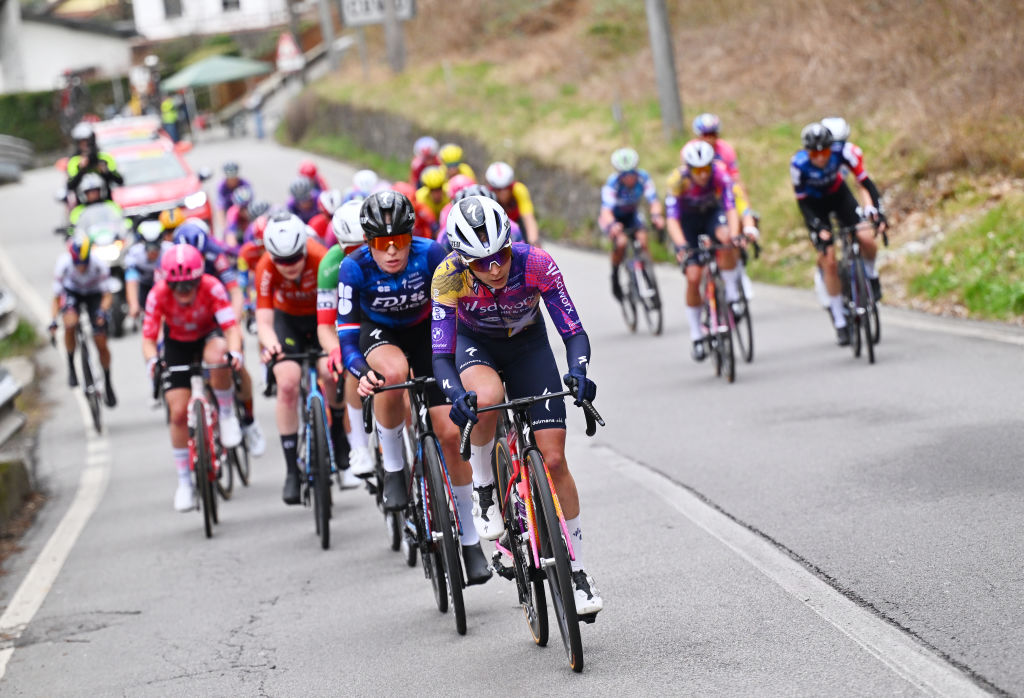Will new rules make USA women's cycling professional?
Optum team to seek UCI registration
The latest race content, interviews, features, reviews and expert buying guides, direct to your inbox!
You are now subscribed
Your newsletter sign-up was successful



In 2013, women in the USA will have a professional national championships that bring equity in both exposure and prize money for the road race, time trial and criterium titles. USA Cycling made an announcement yesterday calling the new rules for the calendar a "women's professional team structure", but what really changes?
As previously announced, USA Cycling will add the women's national championship races to its Professional Road and Time Trial National Championships in Chattanooga, Tennessee on May 25-27. It will also run both the men and women together at the Professional Criterium National Championships on July 27 in High Point, North Carolina.
Similar to requirements introduced for the 2012 National Racing Calendar, USA Cycling announced this week that it will require women to be either on a UCI professional team or registered domestic elite team in order to compete in these professional national championship events.
While the inclusion of the domestic elite team in the major US races allows for the amateurs to compete at the highest level, new UCI rules for World Cups and higher-category stage races may prove limiting for lower budget teams and new riders.
The combined women's and men's professional championships will be a boost for teams like Optum Pro Cycling, which has teams of both genders. Women's manager Rachel Heal was pleased at the news.
"I am fully in favor of combining men's and women's nationals, it is a good step in the right direction that the top women are now being recognized as pro, rather than only amateur, and for a team like Optum which has both men's and women's pro teams it gives us a great opportunity to showcase the two teams together," Heal told Cyclingnews.
For NOW & Novartis for MS team manager Kurt Stockton, the changes at the USA Cycling level aren't necessarily anything new. "It's a step in the right direction," he said about the combined championships, "but I don't know how it can be considered a professional structure."
The latest race content, interviews, features, reviews and expert buying guides, direct to your inbox!
At the current moment, it is the air of uncertainty surrounding the new UCI rules for participation in the top level women's events that is causing consternation.
USA Cycling's announcement that the women's Exergy Tour has been awarded 2.HC status by the UCI was the first official announcement of a brand new classification for women's racing. The 2013 women's calendar will have only three 2.HC events: Exergy Tour, the Internationale Thüringen Rundfahrt der Frauen, and the Premondiale Giro Toscana Int. Femminile - Memorial Michela Fanini. The calendar's only 10-day stage race, the Giro Donne, remains a 2.1.
It is the rules surrounding World Cup and 2.HC team selections that will have the biggest impact on the women's peloton in the USA in terms of teams deciding to seek UCI registration or not. While no official rules have been published, it has been announced that only UCI registered teams will be able to compete in the World Cup races, and the 2.HC races are likely to be limited either to UCI teams or a limited number of national teams.
Stockton was surprised that the rules have apparently been implemented - he only found out about the new category a few weeks ago. "If we are supposed to be bringing women's cycling to a professional level, there needs to be transparency about how all this happens."
The NOW & Novartis team does not plan to seek a UCI license, he said, but will put a priority on the professional national championships. He cited the financial obligations of a UCI registration as one factor, but the main issue is the requirement that half the roster be under 28 years in race age.
"That's a big challenge for all of the women's teams," Stockton said. "A lot of young riders get signed to meet the minimum, but are never raced - that has been going on for years."
Another factor is that only the top 20 teams will be invited to the World Cup races, and that is a barrier for entry for many new teams.
For the Optum team, which had a number of riders compete in the World Cup races and other European races with their national teams, the points have been enough to justify registering as a UCI team, according to Heal.
"Given the UCI points that Optum riders earned in 2012, if we were UCI now, we would currently be ranked at 11th. I'm not certain when the top 20 is taken from, if it's the beginning of the year, or closer to the event, but either way I am confident that we will make the cut," Heal said.
However, Vanderkitten team manager Jono Coulter told Cyclingnews that even though the new rules would exclude his domestic elite team from the Exergy Tour and some of his riders, who race with their national teams, from the World Cups, he doesn't see the trouble of getting a UCI license as worth the effort.
"In 2012 we had four athletes who raced for their national squads, in 2013 we have seven... so we were hoping to fast track the Vanderkitten registration," Coulter said. "Of course there is implicit risk and cost with that, not so much the registration fees but getting into the top 20 teams is not a process we can fast track. In the end we reset to our original path."
Stockton is concerned that limiting the World Cups to the UCI teams will stifle the development of new talent from the countries outside of Europe.
"Teams in countries like the USA, Canada and Australia just don't register as a matter of course like teams in Europe," he said, pointing to the small number of UCI events in those countries as a reason. "These countries rely heavily on a strong national team program to discover and develop new riders."
The national teams have, in the past, been allowed to compete at the World Cup level, where riders such as Megan Guarnier, Amanda Miller and even Olympian Evelyn Stevens got their start.
"Riders like Taylor Wiles, who had her break-out performance at the end of the season with the national team, may not have that opportunity."
Coulter agrees that the new rules will mean that professional teams will have to work harder to find new riders.
"I can see that the aim is to increase the professionalism of the top events. It may mean very talented athletes would have had to race another year or so at other levels before being picked up by an appropriate team to include them in World Cup events.
"Top pro teams will be more selective about the level of athlete on their teams, there will be a lot more scouting of potential athletes perhaps."
Making new rules for teams and riders will not guarantee increased media or television coverage for women's races. Since a huge audience watched a thrilling Olympic Road Race in London this summer, there has been a call for more visibility for the women.
"I hope that the increased level of professionalism of the very top events is similarly supported by the federations and governing body, resulting in enhanced media opportunities and the onflow of commercial and fan interest at the top level," Coulter said. "That will only have a filter down effect across women's cycling and smaller teams wishing to take the jump can show potential sponsors the template for inclusion at the highest level."

Laura Weislo has been with Cyclingnews since 2006 after making a switch from a career in science. As Managing Editor, she coordinates coverage for North American events and global news. As former elite-level road racer who dabbled in cyclo-cross and track, Laura has a passion for all three disciplines. When not working she likes to go camping and explore lesser traveled roads, paths and gravel tracks. Laura specialises in covering doping, anti-doping, UCI governance and performing data analysis.
